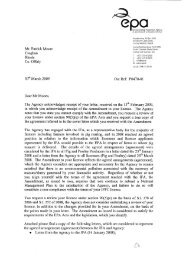Examining the Use of Food Waste Disposers - Environmental ...
Examining the Use of Food Waste Disposers - Environmental ...
Examining the Use of Food Waste Disposers - Environmental ...
You also want an ePaper? Increase the reach of your titles
YUMPU automatically turns print PDFs into web optimized ePapers that Google loves.
3.2.9 Denmark<br />
Consultation with Soil and <strong>Waste</strong> Department, Danish<br />
<strong>Environmental</strong> Protection Agency<br />
Each Danish municipality can choose whe<strong>the</strong>r or<br />
not to permit <strong>the</strong> use <strong>of</strong> FWDs. However, <strong>the</strong> Danish<br />
<strong>Environmental</strong> Protection Agency (DEPA) concluded<br />
from studies concerning <strong>the</strong> use <strong>of</strong> FWDs that <strong>the</strong>y cannot<br />
generally recommend <strong>the</strong> use <strong>of</strong> FWDs because:<br />
• It is estimated that <strong>the</strong> use <strong>of</strong> FWDs will increase<br />
water consumption.<br />
• Using FWDs will cause a rise in sediment in <strong>the</strong><br />
sewers and reduce self-cleansing.<br />
• WWTPs would need extra capacity to treat <strong>the</strong><br />
increased levels <strong>of</strong> organic material from FWDs.<br />
Biogas production at <strong>the</strong> WWTP is required in order to<br />
allow <strong>the</strong> utilisation <strong>of</strong> <strong>the</strong> energy in <strong>the</strong> organic waste.<br />
O<strong>the</strong>rwise, <strong>the</strong> energy needed to dissolve <strong>the</strong> organic<br />
waste in <strong>the</strong> wastewater would increase <strong>the</strong> energy<br />
use and treatment costs at <strong>the</strong> plant significantly.<br />
• An increased impact on <strong>the</strong> recipient/environment<br />
is expected, for example, a risk for an increasing<br />
pollution <strong>of</strong> heavy metals.<br />
The DEPA is concerned that o<strong>the</strong>r types <strong>of</strong> waste<br />
besides organic waste could be disposed <strong>of</strong> in <strong>the</strong> FWDs,<br />
jeopardising many years <strong>of</strong> its work to reduce pollution at<br />
source. Fur<strong>the</strong>rmore, it might give a poor-quality sludge at<br />
<strong>the</strong> WWTP, unsuitable for agricultural use.<br />
The DEPA feels that if <strong>the</strong> general introduction <strong>of</strong> FWDs<br />
would bring socio-economic benefits, it would demand<br />
a more detailed study to allow <strong>the</strong>m to examine <strong>the</strong><br />
possibility <strong>of</strong> this. However, from existing studies <strong>of</strong> FWDs<br />
and <strong>the</strong>ir environmental and economic impacts, <strong>the</strong> DEPA<br />
cannot recommend this technology. FWDs are <strong>the</strong>refore<br />
rarely used in Denmark.<br />
<strong>Examining</strong> <strong>the</strong> <strong>Use</strong> <strong>of</strong> <strong>Food</strong> <strong>Waste</strong> <strong>Disposers</strong><br />
19<br />
3.2.10 The Ne<strong>the</strong>rlands<br />
Consultation with Organic Management,<br />
SenterNovem (agency <strong>of</strong> <strong>the</strong> Dutch Ministry <strong>of</strong><br />
Economic Affairs)<br />
Each Dutch municipality is responsible for granting licences<br />
for draining effluent to <strong>the</strong> sewerage system and <strong>the</strong> control<br />
and maintenance <strong>of</strong> <strong>the</strong>se licence conditions. The Dutch<br />
government advocates a system <strong>of</strong> source separation for<br />
organic waste, and <strong>the</strong> practice <strong>of</strong> composting is regarded<br />
as better for environmental reasons: sending food waste<br />
to sewer is not seen as a form <strong>of</strong> waste recovery. The use<br />
<strong>of</strong> FWDs in all municipalities has been banned since <strong>the</strong><br />
1960s: this was based on a concern with <strong>the</strong> obstruction<br />
<strong>of</strong> <strong>the</strong> sewer system and a deterioration in <strong>the</strong> treatment<br />
<strong>of</strong> wastewater.<br />
3.2.11 Belgium<br />
Consultation with Brussels Environment and Public<br />
Flemish <strong>Waste</strong> Product Society<br />
FWDs are not banned although <strong>the</strong>re are restrictions on<br />
<strong>the</strong>ir use. De-watering units, which collect and crush food<br />
particles, are permitted and food collected in this manner<br />
can subsequently be brought to composting plants.<br />
Article 4 <strong>of</strong> national legislation (3 August, 1976 relating<br />
to discharges <strong>of</strong> <strong>the</strong> water used in ordinary surface<br />
water, in <strong>the</strong> public sewers and <strong>of</strong> rain water run-<strong>of</strong>f)<br />
however prohibits ‘<strong>the</strong> discharge <strong>of</strong> solid waste subjected<br />
beforehand to a mechanical crushing, or water containing<br />
such crushed matters in ordinary surface water and <strong>the</strong><br />
public sewers’. This means that food can be ground but<br />
not flushed away through <strong>the</strong> sewers. Additional reasons<br />
for this prohibition include <strong>the</strong> contribution <strong>of</strong> solid waste<br />
from in-sink FWDs to pipe blockages and <strong>the</strong> development<br />
<strong>of</strong> putrefaction and odours in <strong>the</strong> sewers.











